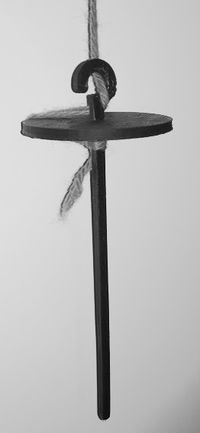| Line 13: | Line 13: | ||
Because spinning yarn does not require any heavy lifting, or the use of one's legs, it is not only a relaxing activity that can be enjoyed at the end of a long work day, it can also be enjoyed by older members of a society and serve as marketable skill. | Because spinning yarn does not require any heavy lifting, or the use of one's legs, it is not only a relaxing activity that can be enjoyed at the end of a long work day, it can also be enjoyed by older members of a society and serve as marketable skill. | ||
[[image:drop_spindle.jpg| | [[image:drop_spindle.jpg|200px|right]] | ||
== Bill of Materials== | == Bill of Materials== | ||
Revision as of 18:18, 4 December 2014
Drop Spindle
Project developed by Alicia Steele
Template:Statusboxtop Template:Status-design Template:Status-prototype You can help Appropedia by contributing to the next step in this OSAT's status. Template:Boxbottom
Abstract
The Drop Spindle is an ancient tool used for spinning fibers such as wool, cotton, flax, and hemp into yarn, without the need for a large, expensive, and complex spinning wheel. Traditionally Drop Spindles are made out of wood with with a notch, groove, or metal hook on the end for securing the yarn. The drop spindle provides the tension necessary to spin yarn and provides a convenient way to introduce twist into the yarn as well as a place to wind yarn as it is being spun.[1] Spun yarn is used for a multitude of processes such as knitting, weaving, crocheting, thread-making and rope-making in order to produce final products. [2] Aside from personal use, products such as clothing and rope are a necessary and marketable product in any society and can be sold or traded in exchange for other necessities.
Because spinning yarn does not require any heavy lifting, or the use of one's legs, it is not only a relaxing activity that can be enjoyed at the end of a long work day, it can also be enjoyed by older members of a society and serve as marketable skill.

Bill of Materials
- PLA Filament, about 20grams
- Marine Epoxy Stick ~$3.39 per container. Only need 1/16 of container.
- Alternatively any super glue or epoxy will do. Natural gums and saps that harden may work as well
Tools needed for fabrication of the OSAT
- MOST Delta RepRap or similar RepRap 3-D printer
Skills and Knowledge Necessary to Make and Use the OSAT
- Basic Usage of 3D Printer
- Tutorial on Using a Drop Spindle
- Tutorial on Finishing Yarn and Wrapping Skein
l
- Provide directions for print/assembly - be detailed enough in your “how to” to ensure that someone could construct the device from your description. Consider the elegance of IKEA like instructions.
- Include print time estimate
- Include assembly time estimate
- Including drawings or pictures of the device at stage of assembly at minimum. (http://www.appropedia.org/Special:Upload)
- Consider video if appropriate
| Example video summary of textbook |
|---|
Error in widget YouTube: Unable to load template 'wiki:YouTube' |
Common Problems and Solutions
- Rod is too large to fit through hole in disk
- Enlarge Hole in disk with pen knife
- Make Rod slimmer using Pen knife
- Be sure not to over do it, ideally you will have a press fit.
- Rod is too small to stay in place in disk
- Use Super Glue, 5-Minute Epoxy, or Marine Epoxy puddy to secure disk to rod
Cost savings
- If your solution is not a low cost one then it is not really appropriate.
- Estimate your costs
- Find a commercial equivalent
- Calculate $ savings and % savings
References
- The sources of information (e.g. engineering handbooks, journal articles, government documents, webpages, books, magazine articles etc.)formation you did. For example: [3]
- ↑ web page: Spindle, Available: http://en.wikipedia.org/wiki/Spindle_%28textiles%29
- ↑ web page: Yarn, Available: http://en.wikipedia.org/wiki/Yarn
- ↑ web page: Department of Energy (DOE) Landscaping and Energy Efficiency, DOE/GO-10095 (1995) Available: http://www.eren.doe.gov/erec/factsheets/landscape.html
Based on the developmental needs addressed (e.g. food, heat, electricity, clean water, health care, etc.) be sure to label your device in the proper categories e.g. use [[Category:Water]]. Be sure to categorize your device so that it will be easy to find – for example “Low voltage connection basics” is categorized in [[Category:How tos]] [[Category:Electricity]] [[Category:Electric lighting]].